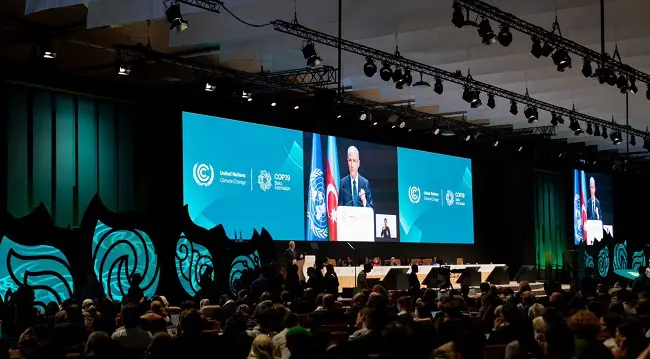The 29th UN climate talks (COP29) concluded in Baku, Azerbaijan, on Saturday after two weeks of intense negotiations, leaving developing nations disappointed by a financial agreement they consider inadequate to address the escalating climate crisis.
Key Outcomes of COP29
At the heart of the discussions was the New Collective Quantified Goal (NCQG), aimed at ensuring developed nations provide the necessary financial support for mitigation, adaptation, and loss and damage in developing countries. However, the final agreement fell drastically short of expectations.
- Developed nations committed to providing $300 billion annually by 2035, far below the $1 trillion grant-based funding demanded by developing countries.
- The pledged amount includes loans, despite widespread acknowledgment of the need for grants, and will decrease in real value due to inflation.
- Developed nations urged developing countries to mobilize domestic resources, disregarding historical emissions and the financial burden borne by climate-vulnerable nations.
Criticism from Climate Advocates
The deal has been criticized as inequitable and insufficient, with many pointing to the influence of fossil fuel lobbyists at COP29 as a major obstacle to meaningful progress.
Harjeet Singh, Global Engagement Director, Fossil Fuel Non-Proliferation Treaty Initiative:
“At COP29, developed nations once again coerced developing countries into accepting a financial deal woefully inadequate for the scale of the crisis. Vulnerable communities are left to face climate disasters without sufficient support.”
Mohamed Adow, Director of Power Shift Africa:
“This COP has been a disaster for the developing world. The rich nations imposed a low-ball finance figure, coming into effect 11 years from now, while lives are being lost today. The deal offers vague promises rather than real, immediate funding.”
Tasneem Essop, Executive Director of Climate Action Network:
“This was supposed to be the Finance COP, but instead, it became a platform for the Global North to betray the Global South. We will not be defeated. The fight for climate justice continues.”
Developed Nations Criticized for Lack of Ambition
The agreement was seen as a step backward, with wealthy countries failing to meet their commitments under the Paris Agreement.
Andreas Sieber, Policy Lead at 350.org:
“The outcomes in Baku diminish the dignity of countless lives and neglect the historical responsibilities of developed nations. Rich countries failed to lead with ambition and equity, leaving the most vulnerable without meaningful protection.”
Namrata Chowdhary, Head of Public Engagement at 350.org:
“Inequity once again dictated the outcome, leaving developing nations with no choice but to accept an inadequate deal. However, the climate movement remains alive and determined, preparing for new waves of global mobilization.”
Future Implications
The failure to secure adequate climate finance threatens the ability of vulnerable nations to adapt to the climate crisis and transition to renewable energy. The inclusion of dubious carbon market mechanisms further undermines efforts to achieve the 1.5°C goal.
What’s Next?
Despite the disappointing outcomes, climate advocates are rallying for stronger action at future summits. COP30 in Brazil is already being viewed as a critical opportunity to reset the global climate agenda, with expectations of increased private finance mobilization and renewed efforts for climate justice.
The COP29 talks in Baku may have ended in disillusionment, but the global climate movement remains resolute in its mission to hold wealthy nations accountable and secure a sustainable future for all.



